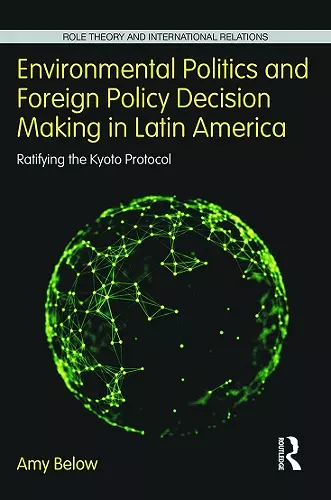Environmental Politics and Foreign Policy Decision Making in Latin America
Ratifying the Kyoto Protocol
Format:Hardback
Publisher:Taylor & Francis Ltd
Published:23rd Dec '14
Currently unavailable, and unfortunately no date known when it will be back
This hardback is available in another edition too:
- Paperback£41.99(9781138287372)

Although the Kyoto Protocol, an international agreement to address global climate change, has been regarded by many as an unsuccessful treaty both politically and environmentally, it stands as one of the world’s few truly global agreements. Why did such a diverse group of countries decide to sign and/or ratify the treaty? Why did they choose to do so at different times and in different ways? What explains their foreign policy behavior? Amy Below’s book builds off the increasing significance of climate change and uses the Kyoto Protocol as a case study to analyze foreign policy decision making in Latin America.
Below’s study takes a regional perspective in order to examine why countries in Latin America made disparate foreign policy choices when they were faced with the same decision. The book looks at the decisions in Argentina, Mexico, and Venezuela via a process-tracing method. Below uses information obtained from primary and secondary documents and elite interviews to help reconstruct the processes, and augments her reconstruction with a content analysis of Conference of the Parties speeches by presidents and country delegates. The book complies with convention in the field by arguing that systemic, national and individual-level factors simultaneously impact foreign policy decisions, but makes the additional claim that role theory most accurately accounts for relationships between variables.
Environmental Politics and Foreign Policy Decision Making in Latin America considers a variety of factors on individual, national, and international levels of analysis, and show that the foreign policy decisions are best viewed through the prism of role theory. The book also draws conclusions about the value of role theory in general and about environmental foreign policy decisions in developing countries, which will be of value to both policy-makers and academics.
"Amy Below’s book is a real contribution to Foreign Policy Analysis (FPA). The study of foreign policy decisionmaking in developing countries is sorely lacking, as is the study of environmental policy: Below tackles both lacunae in the same volume. Utilizing role theory to explain the differences in Latin American leaders’ responses to the Kyoto Protocol, Below explores the intricacies of role formation in three Latin American nations. Her careful process-tracing, bolstered by content analysis, is both solid and persuasive. Below’s book will be an important resource for FPA scholars as well as scholars interested in cross-national differences in environmental policymaking."—Valerie M. Hudson, Texas A&M University
"Amy Below’s study of the ratification of the Kyoto Protocol by various countries in Latin America sits at the theoretical intersection of foreign policy analysis, role theory, and environmental politics. Her study serves as a model for all three areas of inquiry, and provides an excellent road map for the fruitful use of role theory in foreign policy analysis and beyond."—Marijke Breuning, University of North Texas
ISBN: 9780415703307
Dimensions: unknown
Weight: 430g
208 pages